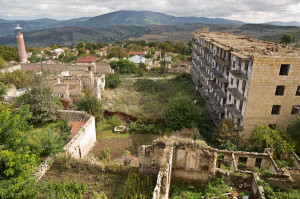Newspaper Article 02/03/2015

Ceasefire agreement that put an end to active fighting between Armenian and Azerbaijani forces for control over Nagorno-Karabakh in 1994 was considered to be the first step towards the resolution of Nagorno-Karabakh conflict, but even after 21 years of the truce, the situation stays the same.
Though the legal basis for the conflict’s settlement is reflected in the UN Charter, the Helsinki Final Act, four resolutions of the UN Security Council, the resolution adopted by the UN General Assembly in 2008, as well as in the decisions and resolutions of the OSCE, NATO, the Council of Europe and other international organizations, yet the issue remains unresolved.
Of all the organizations, the main international format mandated with the task of carrying out negotiations among the parties is the Minsk Group of the Organization for Security and Cooperation in Europe (OSCE) which is co-chaired by Russia, the United States and France since 1997, but by now the Group has failed to formulate a comprehensive and mutually agreeable conflict resolution plan.
Falling short of failing its responsibilities, even last year on the occasion of twentieth anniversary of ceasefire agreement, instead of coming up with some concrete plan or possible future strategy (taking into account that the span of 20 years was more than enough to wait for the parties to come on an agreement themselves) OSCE’s Minsk Group issued a statement only, reiterating goodwill commitment and hopes towards the resolution of the conflict.
Moreover while working on the Nagorno-Karabakh conflict, it is vital to evaluate the composition of OSCE Minsk Group co-chairs that is dominated by Western states consisting of large active Armenian Diasporas in their countries, for the reason that the indecisive position of the Nagorno-Karabakh conflict itself demonstrates that if the international community has had a sufficient interest in the Nagorno-Karabakh conflict, it would have exerted diplomatic pressure on Armenia under international law based on territorial claims against neighboring states.
Amidst the knowledge of presence of such prejudiced facts, it is thought-provoking to also demonstrate and analyze the contributions made thus far by Muslim countries, since Azerbaijan hasbrought forward Nagorno-Karabakh conflict to the attention of the international community atall possible international forums.
However, to cover all the Muslim World in one article is a difficult task to achieve, hence the focus here is limited to evaluating the role of Organization of Islamic Cooperation (OIC) as it is the largest organization of the Islamic countries and second largest organization after the United Nations.
By far the Organization of Islamic Cooperation has unanimously put forwardand adopted 22 resolutions as part of its efforts to support Nagorno-Karabakh conflict.Though these resolutions are significant in terms of providing legal support, yet like all other resolutions passed by numerous organizations, OIC’s 22 resolutions have failed to bring about even little change in the Nagorno-Karabakh situation.OIC’s increased involvement into the conflict is cancelled out on account of possibility that it may lead to the situation where Armenia may back out from any kind of negotiation attempts.
In view of above risk perception, over the years many other alternative strategies have been worked out by Azerbaijan suggesting enhanced role of NATO, EU, Council of Europe, reforms in OSCE Minsk Group and its co-chairs, etc. Although possessing the possibility to take practical shape these options have never materialized because these organizations are not enthusiastic to get involved into the process or do something more than just stating words that lack actions. Up till now the alternate options are only being debated, neither worked out nor negated completely.
Summing up the role of international organizations, it can be argued that after waiting for 20 years, hoping for the resolution of Nagorno-Karabakh under the co-chairmanship of OSCE Minsk Group, Azerbaijan together with its other possible supporting allies should now try to develop an effective program of practical actions.The suggestion to bring reforms in OSCE Minsk Group and composition of its co-chair, and demand for shift from OSCE led mediation process towards other major organizations that can possibly play an effective role in resolution of the Nagorno-Karabakh conflict is not new. The demand of the time is to pursue such foreign policy options that can help convert suggestions into implementable measures so as to resolve Nagorno-Karabakh conflict as one of the priorities of Azerbaijan’s foreign policy objectives.
Published by AZERNEWS on February 26, 2015
Disclaimer: Views expressed are of the writer and are not necessarily reflective of IPRI policy.
